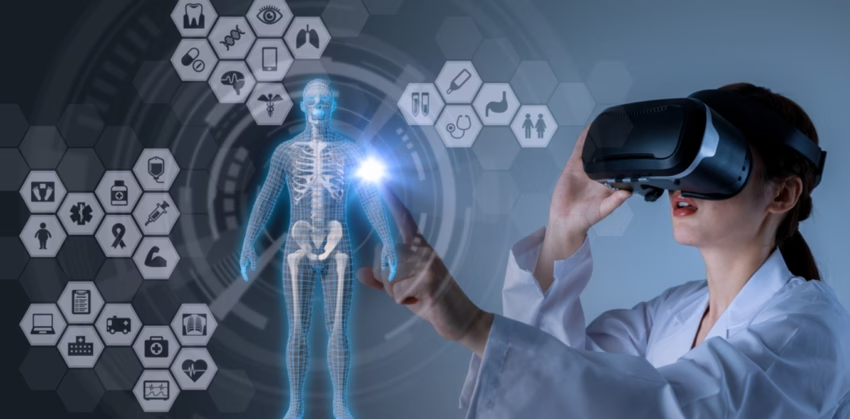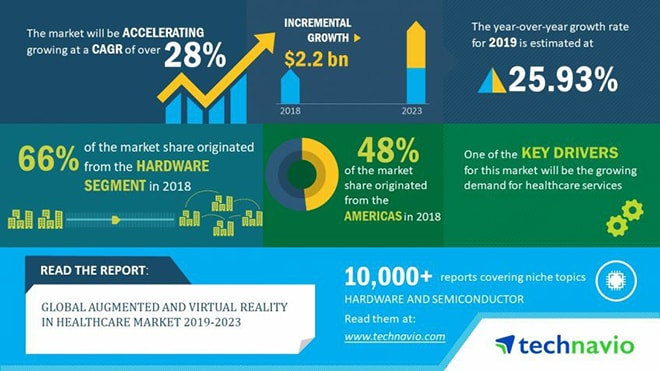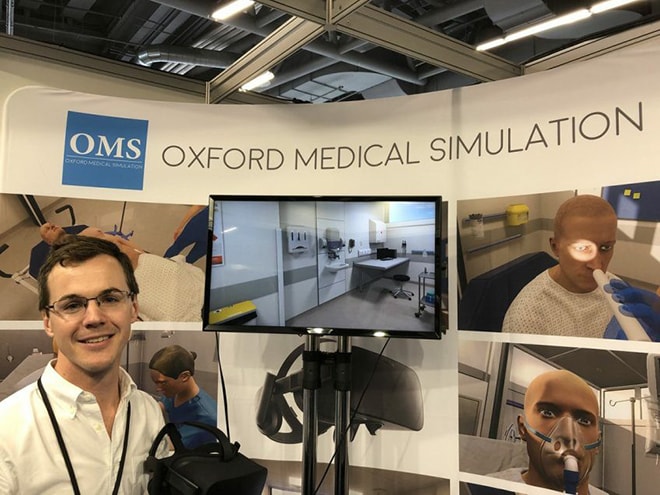
What Are VR Applications in Healthcare?
Are you interested in exploring the market and benefits of VR applications in healthcare?
The global virtual reality and augmented reality application market in healthcare is expected to reach 18.7 billion USD by 2028.
Let's see the role of VR applications in the healthcare industry in detail.

Get a complimentary discovery call and a free ballpark estimate for your project
Trusted by 100x of startups and companies like
How VR Applications in Healthcare Are Helping Medical Professionals?
VR simulators are helping doctors and nurses in hospitals in various ways, e.g.:
- Training doctors using cadavers is effective, however, cadavers are expensive. VR headsets are cheaper, moreover, businesses can amortize the total cost of the VR solution they buy for medical groups teaching lessons.
- Hospitals using VR simulators to train doctors don‘t have to spend time and money on preparation and clean-up like they do when they use cadavers.
- The virtual environment also makes it easy for trainee doctors and nurses to go through the training multiple times using virtual reality tools.
- There are rare types of surgeries, and it‘s hard to train doctors in them. However, virtual reality technology can help since the organization can design training modules once and use them repeatedly for medical education.
- Medical students and trainees from multiple locations can benefit from training using VR simulators since they can participate in virtual operating rooms built using virtual reality simulation.
- Elaborate patient medical education is possible through VR technology. Hyper-realistic CGI allows one to view and understand the patient's conditions in detail. This helps in working out more effective treatment methods.
- Training of healthcare providers can be conducted in a safer environment. They can practice critical surgical procedures without any danger to the patients.
- The ability to conduct these VR-simulated surgeries remotely from anywhere instead of in an operating room makes them more cost and time effective.
- Virtual reality solutions are also helping in providing adjunctive therapies for psychological issues without going anywhere physically. Moreover, VR immersions are assisting in providing appropriate physical therapy such as stroke rehabilitation and pain management by reducing recovery time significantly.
- Virtual reality rehabilitation makes therapies and exercises more fun and less tiring, especially in longer recovery phases while making patients more focused.
You can read more about this in “Virtual-reality simulations offer medical residents hands-on practice”.
The Market for VR in the Healthcare Sector

The demand for VR is growing in the healthcare sector, and the following statistics illustrate this:
- A GlobeNewswire report projects that the market for VR in healthcare will grow from $1.8 billion back in 2018 to $6.91 billion in 2026, with a CAGR of 16.21%.
- Another study stated that VR in healthcare would grow by 53% through 2023, and you can read this report in “Healthcare virtual reality market to grow at 53% CAGR to 2023”.
Estimates vary, however, experts agree that the growth potential of VR in healthcare is high.
Examples of VR Healthcare Simulator Platforms
Let‘s now review a few examples of VR healthcare simulator platforms:
1. Oxford Medical Simulation
Oxford Medical Simulation is a healthcare virtual reality simulator. Healthcare organizations can use it to optimize their training process. The platform is globally accessible, and Oxford Medical Simulation uses Oculus virtual reality headset.
1,200 top developers
us since 2016
There are simulators for medical, nursing, and pediatric disciplines. As a motion simulator, it is interactive, and it adapts to user actions. Trainees receive personalized feedback, furthermore, they can see real-time reports with performance metrics.
It is ideal for training first-time students as well as further training for experienced professionals.

2. SimX
SimX uses both VR and AR, and the company claims that its solution costs only 1/10th of traditional mannequin simulation. It offers the key features of virtual reality healthcare simulators.
For example, fully immersive experience, real-life job simulators, virtual patients, virtual environments, portability, and multiplayer mode.
SimX works on key VR platforms like HTC Vive, Gear VR, etc.
Looking Forward to Engaging in Healthcare VR Application Development?
The latest technologies of artificial intelligence, virtual reality, and augmented reality are improving the experience and effectiveness of medical solutions. It is just the right time to incorporate these technologies into your healthcare applications.
However, to do this successfully, you must have a professional team of software developers with experience in developing and deploying such solutions based on cutting-edge technologies.
DevTeam.Space can help you here in partnering with such field-expert software developers from its vetted software developers community. Read our guide on "How to build a VR simulator for healthcare professionals" to gain insight into our expertise.
You can easily outsource these competent developers according to your project requirements by sending us your initial product specifications via this quick form. One of our account managers will reach out to you with further assistance.
Frequently Asked Questions
Virtual reality in healthcare is helping doctors to understand the anatomy and pathology of a patient in detail that is impossible otherwise. Moreover, complicated real-life surgical procedures are possible with VR simulators. VR immersions using a VR headset also help in providing psychological and physical virtual reality therapy to patients.
Virtual reality can be used for healthcare, real estate, tourism, retail, etc.
Virtual reality can provide non-immersive, semi-immersive, and fully-immersive solutions.


